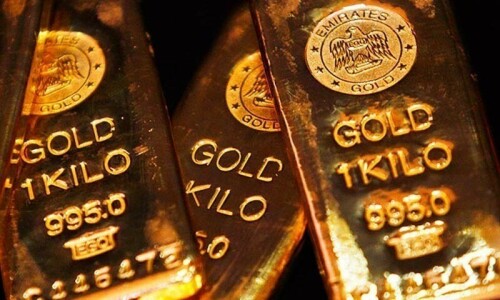
Gold has undisputedly remained the most popular commodity throughout recorded human history. From being used in the death masks for pharaohs in ancient Egypt to ingots (oblong-shaped bars which served as currency) in ancient China, gold has held an eminent status for a variety of reasons. Rulers in various civilisations hoarded it to display affluence and as a means to amass reserves for any future contingency.
Gold became the cornerstone of international trade with the adoption of the gold standard in the 19th century, which linked the value of major global currencies to a fixed quantity of gold. It meant that gold reserves backed the currencies. The primary motive behind this system was to keep a check on arbitrary inflation.
A modified version of the gold standard was the famous Bretton Woods Agreement in 1944, whereby it was agreed to peg the currencies of participating countries to the dollar while the dollar was tied to gold. The agreement remained in place for over a couple of decades until 1971 when the then President of the United States (US), Richard Nixon, abruptly halted the dollar’s convertibility to gold. The move is recollected as the “Nixon Shock” in modern finance literature.
Even today, gold is in demand either for its use in jewellery or its suitability as an investment avenue. Jewellery is an integral part of the culture and wedding rituals in Pakistan and many other countries, and gold, one of the most precious metals, is at the heart of this culture.
The precious metal has proven to be a safe investment bet during times of economic turmoil and due to its diversification benefits
From an investment viewpoint, gold has empirically proven to be a safe bet during times of economic turmoil and in periods of high growth, it provides diversification benefits when added to a portfolio of traditional assets like stocks and bonds. This makes it imperative to understand the dynamics of gold price in Pakistan.
The gold price in Pakistan is a function of two inputs: the international gold price and the exchange rate. Simply put, the price of gold in Pakistan will rise if there is an increase in international gold price or if the rupee devalues against the US dollar. The former primarily depends on the US monetary outlook but is also impacted by geopolitical events and the demand for gold by affluent countries like China. The latter is an outcome of Pakistan’s external account and provides a hedge against the currency devaluation risk.
The per tola price of gold in the local Sarafa market increased from Rs216,000 to Rs241,700 in FY24 and is currently hovering near a record high of Rs260,000 per tola owing to a steep uptick in international gold price while the currency remained relatively stable of late.
The gold price internationally is surging on the anticipation that the US central bank, the Federal Reserve (commonly known as the Fed), will begin monetary easing (interest rate cuts) in its upcoming Federal Open Market Committee meeting in the mid of September. A higher-than-expected rate cut and the policy direction of the Fed will likely determine the future course for the bullion.
Investors in Pakistan who wish to seek exposure to gold can buy it directly from the Sarafa market locally or can purchase a gold contract from the Pakistan Mercantile Exchange (PMEX) through a brokerage account. PMEX, being regulated by the Securities and Exchange Commission of Pakistan, has the advantage of regulatory oversight.
However, it will be costly to purchase a tola-based gold contract, so, alternatively, the investors can opt for a gold-based collective investment scheme, which is simply a mutual fund that invests in gold. But one must know that gold is a long-term investment avenue with a high risk of principal erosion, so it is critical to understand how the factors impacting gold price are at play at any given point in time.
The writer is a finance professional and a graduate of the Institute of Business Administration, Karachi
Published in Dawn, The Business and Finance Weekly, September 2nd, 2024

















































